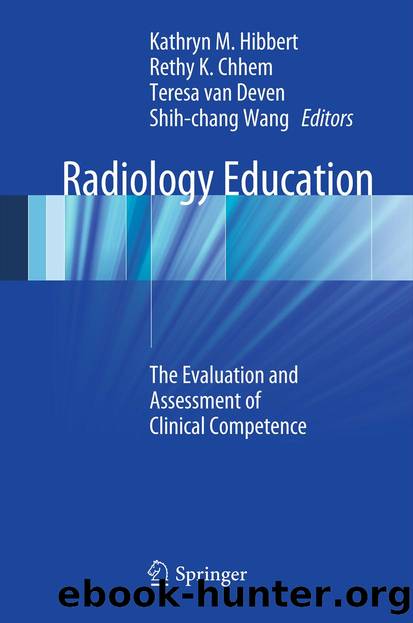Radiology Education by Kathryn M. Hibbert Rethy K. Chhem Teresa Deven & Shih-chang Wang

Author:Kathryn M. Hibbert, Rethy K. Chhem, Teresa Deven & Shih-chang Wang
Language: eng
Format: epub
Publisher: Springer Berlin Heidelberg, Berlin, Heidelberg
8.14 Conclusions
Assessment and evaluation of trainees in RANZCR radiodiagnosis training program has changed dramatically with the introduction of the current curriculum. Although the major barrier summative examinations have not changed, these are being reviewed. The major change for training centres has been the introduction of several workplace-based assessments and an increase in frequency and quality of the regular Director of Training trainee evaluations.
The development and selection of these assessment tools was approached using education best practice principles and was informed by adoption by many other training programs in other disciplines.
The implementation of these tools has highlighted the significant administrative load that such assessments have brought to training centres, and has raised questions about the value, validity, and effectiveness of so many assessments. Clearly the new curriculum requires a cultural shift in the assessment and evaluation culture for all training centres. The College is actively committed to helping this shift to occur through roadshows and DoT Workshops that are regularly conducted to discuss problems and provide assistance and support as required.
Despite these teething problems, training centres have actively adopted the tools and have for the most part managed to use them effectively to date. As the program evolves, the proportion and number of trainees having to undertake these assessments will progressively rise, which will undoubtedly lead to additional stresses on the training centres and trainees alike.
Many fellows in personal communication, the senior College executive, and College staff are strongly supportive of the major changes in assessment and evaluation that are part of the new training program. The recognition for the benefits of such changes is widespread, even if the implementation is challenging.
The College is aware of these issues and plans to evaluate the training program’s assessment tools, utilisation, administrative burden, and effectiveness actively over the coming years. The College is committed to a move towards becoming not only an educational organisation but also a learning organisation. Such evaluation is essential to determine which of these tools is providing the most useful formative assessments and contributing meaningfully to training site evaluations of trainee performance. The correlation between such workplace assessments and final examination outcomes will be of particular interest.
Finally, as part of a re-engineering of the entire curriculum, the introduction of digital technology to the examination process not only permits but almost mandates a formal review of the examination system, in order to better align its assessment objectives and methodology with the changes and increased frequency of other types of assessment and evaluation that have been introduced into our training program.
Download
This site does not store any files on its server. We only index and link to content provided by other sites. Please contact the content providers to delete copyright contents if any and email us, we'll remove relevant links or contents immediately.
| Automotive | Engineering |
| Transportation |
Whiskies Galore by Ian Buxton(41994)
Introduction to Aircraft Design (Cambridge Aerospace Series) by John P. Fielding(33120)
Small Unmanned Fixed-wing Aircraft Design by Andrew J. Keane Andras Sobester James P. Scanlan & András Sóbester & James P. Scanlan(32789)
Craft Beer for the Homebrewer by Michael Agnew(18237)
Turbulence by E. J. Noyes(8040)
The Complete Stick Figure Physics Tutorials by Allen Sarah(7363)
The Thirst by Nesbo Jo(6932)
Kaplan MCAT General Chemistry Review by Kaplan(6926)
Bad Blood by John Carreyrou(6611)
Modelling of Convective Heat and Mass Transfer in Rotating Flows by Igor V. Shevchuk(6432)
Learning SQL by Alan Beaulieu(6280)
Weapons of Math Destruction by Cathy O'Neil(6264)
Man-made Catastrophes and Risk Information Concealment by Dmitry Chernov & Didier Sornette(6005)
Digital Minimalism by Cal Newport;(5749)
Life 3.0: Being Human in the Age of Artificial Intelligence by Tegmark Max(5547)
iGen by Jean M. Twenge(5408)
Secrets of Antigravity Propulsion: Tesla, UFOs, and Classified Aerospace Technology by Ph.D. Paul A. Laviolette(5366)
Design of Trajectory Optimization Approach for Space Maneuver Vehicle Skip Entry Problems by Runqi Chai & Al Savvaris & Antonios Tsourdos & Senchun Chai(5066)
Pale Blue Dot by Carl Sagan(4996)
